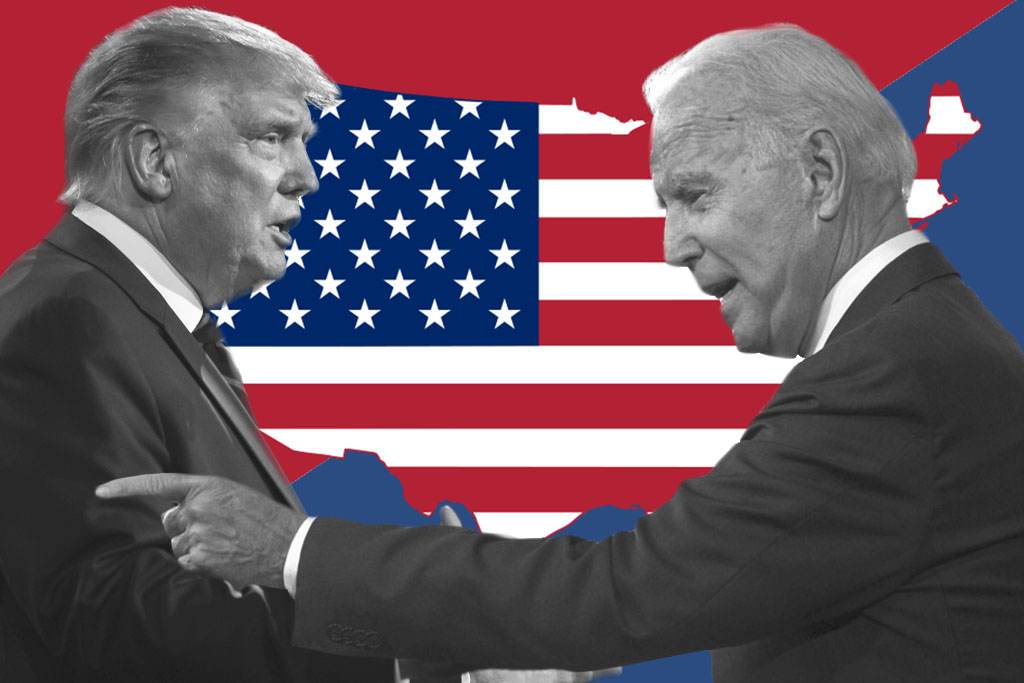By Tridivesh Singh Maini
Introduction
Addressing a campaign gathering in Florida, US President Joe Biden said: “If the US stepped off the world stage, like Trump wants us to do, who would lead the world?”
Biden, who will be taking on Donald Trump (the Republican candidate and former US President) in the November 2024 election, repeated the point that leaders of several countries told him, on the sidelines of international meetings like G7 and G20, that they wanted Biden to win. Earlier too in a campaign meeting, the US President had made this point.
While Trump has been consistently leading in opinion polls, Biden has begun to catch up in recent months. According to a recent poll, Trump has a mere one percent lead over Biden – 46% to 45% — until a few months ago this lead – estimated at 5% — was much wider.
Significantly, Trump is leading in six of the seven swing states — Pennsylvania, Michigan, Nevada, Arizona, Georgia and North Carolina. In Wisconsin, both are tied.
Biden realises the importance of winning these swing states which played an important role in his 2020 win. Earlier this month, while campaigning at Pittsburgh (Pennsylvania), Trump called for tripling of tariffs against China. Said Biden: “..we’re in a stronger position to win the economic competition in the 21st century against China, or anywhere else, because we’re investing in America and American workers again.”
The US President urged United States Trade Representative Katherine Tai to review the current section Section 301 tariffs on steel – estimated at 7.5%. This decision was aimed not just at sending out a message that Biden while wanting to engage with China is not soft on the latter, but also to US workers in states like Pennsylvania and Wisconsin – referred to as ‘rust belt’ states.
Biden’s China policy
While pursuing tough economic policies vis-à-vis China, the US President has been consistent in his approach of preventing ‘competition’ from turning into conflict. One of the essential hall marks of this has been high level engagement with China. Biden met with Xi Jinping on the sidelines of the G20 Summit in Bali in November 2022 and in November 2023 on the sidelines of the APEC. He also spoke with Xi in April 2024. While the US President put forward US concerns on key economic and strategic issues, as did Xi, both sides also reiterated the importance of continuous engagement and dialogue at the highest level.
US Secretary of Treasury Janet Yellen visited Beijing earlier this month – April 5-8, 2024 — as did US Secretary of State, Anthony Blinken (April 24-26, 2024).
Apart from a tough but pragmatic China policy, Biden has also worked closely with US partners and allies in the Indo-Pacific. Only recently, the first of its kind US-Japan and Philippines leaders trilateral summit was held in Washington. All three sides agreed to strengthen not just strategic cooperation, but also in areas like tech and infrastructure.
Biden’s remarks need to be taken with a pinch of salt and other countries will have to engage with whoever is in power in Washington DC. Trump has often spoken about his personal rapport with several world leaders, aside from Putin, and how he would end the Russia-Ukraine war. Many analysts believe Trump’s less interventionist and more inward looking foreign policy is good, in some ways, not just for the US but for the global order as well. The former US President’s stance on North Atlantic Treaty Organisation (NATO), defence ties with South Korea and Japan is driven solely by transactionalism. This has not sent the right message to allies. Immediately after taking over as President, Trump had pulled out of the Trans-Pacific Partnership (TPP) – now the CPTPP, in 2017 and in 2018 the US withdrew from the Iran Nuclear deal. While pulling out of the TPP sent out a wrong message in Asia, the decision of Trump to pull out from the Iran deal has only pushed Tehran closer to China and Russia. Trump on his part has blamed Biden’s weak Iran policy for the conflict in the Middle East. The former president said that the relaxation of certain sanctions gave Iranian proxies the much required breathing space.
If Trump were to win the presidential election, later this year, the domestic and foreign policy challenges he will face in 2024 will be far more serious and he would need to be far less transactional. In his latest criticism of Biden’s Middle East policy, Trump said: “It all starts with Joe Biden. The signals he puts out are so bad. And I can tell you he’s no friend of Israel, that’s for sure. And he’s no friend of the Arab world either,”
In conclusion, it is tough to ascertain whether world leaders have actually told Biden that they want him to get re-elected. If Donald Trump were to win Trump 2.0 would need to be different from Trump1.0, given the current global economic and geopolitical landscape.
Author’s Bio
Tridivesh Singh Maini is an Assistant Professor at OP Jindal Global University. His research interests include — India’s ties with its extended neighbourhood (with a focus on Gulf and Iran), Geo-economics in South Asia, The Belt and Road Initiative (BRI) and the role of India’s states in the country’s external relations.
Image Source: https://www.realinstitutoelcano.org/en/commentaries/god-arms-and-law-biden-or-trump-nothing-will-be-as-before/

